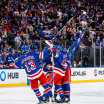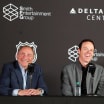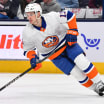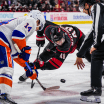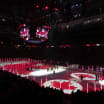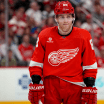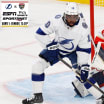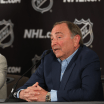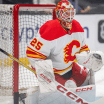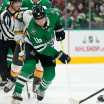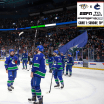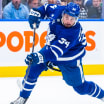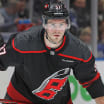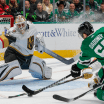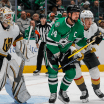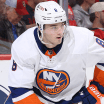MONTREAL -- The past few weeks have been a roller-coaster ride, both exhilarating and terrifying, for fans of the Montreal Canadiens.
It began with the 2016 NHL Draft, continued through the blockbuster trade of defenseman P.K. Subban to the Nashville Predators for Shea Weber, and dove straight into unrestricted free agency.
The blizzard of activity was followed by Canadiens development camp, five days for management to have a look at the organization's prospects, fans packing the training complex in Brossard, south of downtown, for their hockey fix.
Canadiens GM won't carry burden of P.K. Subban trade
In exclusive interview, Marc Bergevin says he's 'moved on' since dealing defenseman for Shea Weber
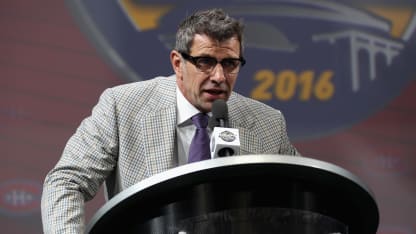
© Dave Sandford/Getty Images
Now, summer should settle for a bit, and no one is looking forward to catching his breath more than Canadiens general manager Marc Bergevin, the man at the controls of this thrill ride.
Bergevin sat for almost an hour Thursday with NHL.com in his office in Brossard for an exclusive Q&A:
NHL.com: Here we are on a hot summer afternoon, eight days after the start of nuclear winter in this city. You knew when you traded P.K. Subban for Shea Weber that you weren't dealing a garden-variety third-line wing. Has the dust settled for you, even a little?
Bergevin:There was a lot of thought going into this [trade] prior to that day, a lot of discussion internally. I had talked to my hockey people. At the end of the day, I make the decision. It's on my shoulders, and I get that. But once I make that decision, I don't look back anymore. It's like the old expression, "If you're looking in the rearview mirror, you don't see what's ahead of you." There was a well-thought process of how and why. As a group we talked, and then I made the final decision, and after that, I move on. If you're asking me "since that day…" well, I have moved on, yes.
NHL.com: This will long be a "where were you when …" moment for many Canadiens fans. Do you recall when the decision became totally clear in your mind? After you'd had the conversation with Predators GM David Poile and you'd worked out the details in your mind and on paper and said, "Yes, let's do this," do you recall any particular feeling? Or for you, was it just another deal to improve the Canadiens?
Bergevin: A deal of that magnitude, there's a lot of … the last night (June 28), I really had to sleep on it. Did I sleep well? No, not really. I got up really early and I had that feeling that this was the deal I had to make. When David and I made contact again (on June 29), it was early afternoon, I knew in my mind that if he agreed, I was going to do it.
David couldn't reach Shea, and I couldn't reach P.K., so that's why the trade was pushed back a little bit. You want the player to hear your voice. Once both players know, then you can make an announcement. You don't want them to hear from a source other than his own general manager.
David first called me on [June 24, the first day of the NHL Draft in Buffalo]. Up to that point, there was nothing else going on. Teams had called in the past. If someone was going to offer you a "wow" deal … but they just kicked tires. A lot of teams do that; it's part of their job.
But on [June 24] around noon, David called me. I was driving to Buffalo from Toronto, where our group was staying for the draft. We chatted briefly, he mentioned [Weber for Subban] and he said, "I'm not sure," and I said, "I'm not sure either."
I said, "Let's let the draft go by; we're going to be busy the next couple of days. We can sleep on it over the weekend and touch base on Monday."
We did, it was still alive, so we talked some more. There were other parts that we tried to get involved to make it a little bigger, but at the end of the day, it didn't work out. Some trades take a long time, some are a lot faster. It all depends.
NHL.com: Did you bring Geoff Molson, the team owner and your boss, in on this trade as it began to take shape in your mind? Or was it finally in the end, you telling him, "Geoff, for your information, this is what I'm doing." Or something in between?
Bergevin:Obviously, circumstances are a little different with P.K. There's one thing with Geoff: He's been good all along -- he leaves it to me to make the hockey decisions. I keep him informed. I tell him, "This is why, and this is the risk." Any transaction you make, there's always a risk. Always. Small transaction or big. And I lay it out to Geoff, and he tells me, "You're here to make hockey decisions, so make this team better. That's your job."
NHL.com: This trade has impact beyond the ice -- marketing, the time and energy and effort the team has invested in P.K., the engagement in Subban of fans and the community. Did that factor into the thought process?
Bergevin: I always say, "You don't want 23 robots." I have no issues with personality. Everybody's different, everybody brings different things to the table. But at some point I had to make a hard decision where I thought I could make the team better. That's when we pulled the trigger. And those who insist the trade was made to please [coach] Michel Therrien? That's [nonsense]. Mike didn't know anything -- anything -- about the trade until after it was made.
NHL.com: Have you spoken with your leadership group since the trade was made? To your captain, Max Pacioretty, to goalie Carey Price, and alternate captains Andrei Markov, Tomas Plekanec and Brendan Gallagher?
Bergevin: Yes, all of them. But they're out of town, so it was on the phone, short conversations. They lost one of their teammates, but they understand what's coming with Shea Weber. I wish we could start the season next week. Three months of waiting for the season to start is going to be a long time.
NHL.com: Shea Weber arrives in Montreal with a very good toolbox of skills, among them leadership, a heavy shot and his power-play presence. Chicago's Jonathan Toews said he's happy Weber has gone to the Eastern Conference. What's the most important thing that he brings to your team?
Bergevin: Instant credibility, as far as his credentials. He's won two Olympic gold medals and he's a guy who, like Carey Price, has a presence that right away brings credibility to your team. He'll be a great complement to our captain, Max Pacioretty, and to our leadership group. Shea's a big man and he's hard to play against. If you're lined up against Shea Weber, nothing's going to come easy. To me, that's something that we missed last season.
NHL.com: What kind of conversations have you had with Weber to this point?
Bergevin: I talked to him right when we made the trade, then the next day I talked to him, a discussion I made public, about (signing free agent forward) Alexander Radulov, because I know they played together in Nashville. I know there are plans for Shea to come to Montreal, but I don't have a set date. At that time, I'll sit down with him.
NHL.com: Did you get the sense from him, even in that brief conversation, that he understands how unique the Montreal hockey market is?
Bergevin: He's got the pedigree to play in this market because of the type of person he is. He's not someone who gets rattled. He made it clear: "I'm not P.K., I am who I am." Nothing's going to faze him. They're two different players. They're two very good players, but he is what he is and he's going to stay that way. What we traded for is Shea Weber. We need a type of defenseman like Shea Weber.
NHL.com:P.K. Subban wore an alternate captain's "A." Will that go to Weber next season?
Bergevin: I've talked to [Therrien] briefly about that. Yes, it will.
NHL.com: Andrew Shaw, who was acquired from Chicago during the draft by trade, brings some grit to your lineup -- two Stanley Cup titles and a knowledge of what it takes to win. What appealed to you about him?
Bergevin: Two Stanley Cups in five years. I like guys who don't like to lose. Everybody likes to win, everybody's happy when you win. I want guys, when you lose, it gets them inside. It hurts. And then you go back to work the next day.
I don't want a guy who walks out of the rink thinking, "Everything is cute, everything is fine even though we lost the game, life goes on." Yeah, life goes on, but I want guys who feel hurt by a loss. It's the culture that I want. It's the Chicago culture, that's what I want.
Andrew Shaw has it. I was in Chicago long enough to know they don't take losing with a grain of salt. I want guys who don't like to lose.
NHL.com:With your team's development camp behind you, and as you now head into the summer with every player signed and your coaching staff set, do you have a final reflection about last season?
Bergevin: What is sometimes forgotten, and I strongly believe this, is that we were missing Carey Price, our No. 1 goaltender, for pretty much the whole year except for 12 games. That was a big, big blow to our team. We needed to play about .500 after about Dec. 5. If we had, we'd have been around 100 points, which gets you in [the Stanley Cup Playoffs]. We weren't able to do that.
(Backup goalie) Mike Condon did the best he could for a rookie. I'm not taking anything away from him. But we still should have been able to hang in there and we didn't.
The loss of Gallagher hurt too. (Gallagher missed 17 games between Nov. 25 and Dec. 29 with broken fingers). Missing Pricer and Gally really hurt, and we weren't able to right the ship. There was something missing in that room, and it affected us.
But I knew I had to straighten our room and bring in some good players. We lost Manny Malhotra toward the end of his career (unsigned last summer), and Gio (former captain Brian Gionta, who signed with the Buffalo Sabres as an unrestricted free agent in July 2014). Pricer, even though he's not a vocal leader, he's a leader. He has a presence in that room.
NHL.com: And when a player is injured, he's not in the room …
Bergevin: Carey's not on the road either, and especially with his injury, his recovery took longer than we thought. By bringing in Shea Weber and Andrew Shaw, I feel that we addressed that. Also, having Pricer healthy. And the last thing is, what this group went through last year -- it's OK to fall down, but you have to get up. I like to believe that those guys won't let that happen again.
